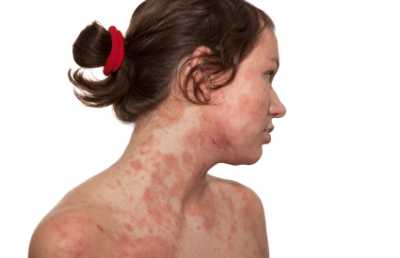Contact Dermatitis
Finding Relief from Contact Dermatitis
Contact dermatitis can be very uncomfortable. While the condition isn’t contagious or life-threatening, it can be irritating and itchy. Contact dermatitis is brought on by a reaction your body has to a chemical that it comes in contact with. For example – have you ever used a new skincare product or a new detergent, and your skin became irritated after using it? Then you’ve probably experienced contact dermatitis.

While most reactions aren’t severe, they can be unpleasant to deal with until the itching goes away. There are some contact dermatitis treatment options out there, but the most important step towards treatment is finding out what is behind the rashes.
What Are the Symptoms of Contact Dermatitis?
Contact dermatitis usually happens when an area of the body is directly exposed to something it is sensitive to – like if your leg brushes against poison ivy or you wear a watch or bracelet you are sensitive to. The rash can develop within minutes or even hours after it is exposed and usually lasts for several weeks.
Here are the differences between the two types of contact dermatitis.
Allergic Contact Dermatitis
- Dry, scaly, or flaky skin
- Hives
- Oozing blisters
- Skin redness
- Skin that appears darkened or leathery
- Skin that burns
- Extreme itching
- Sun sensitivity
- Swelling, especially in the eyes, face, or groin areas
Irritant Contact Dermatitis
- Blistering
- Cracking skin due to extreme dryness
- Swelling
- Skin that feels stiff or tight
- Ulcerations
- Open sores that form crusts
What Causes Contact Dermatitis?
There are thousands of allergens and irritants that cause contact dermatitis. When your skin comes into contact with one of these allergens, it can cause irritant dermatitis or allergic dermatitis. In some cases, the substances could cause both reactions.
Allergic Contact Dermatitis
When your skin touches a foreign substance, it can have an allergic reaction. This causes the body to release inflammatory chemicals that can make the skin feel itchy and irritated. Usually, this will only happen to the area that came into contact with the allergen.
These are the most common causes of allergic dermatitis:
- Jewelry made from nickel or gold
- Latex gloves
- Perfumes
- Chemicals found in cosmetics and skincare products
- Poison oak or poison ivy
Irritant Contact Dermatitis
This is the most common type of contact dermatitis. This happens when your skin comes into contact with something toxic. Some people can have a reaction after a single exposure to the toxin. Other people may develop signs and symptoms after repeated exposures.
These are the most common irritants:
- Battery acid
- Bleach
- Drain cleaners
- Kerosene
- Detergents
- Pepper spray
Related Pages
- Treatment for Flaky Facial Skin from Dandruff and Rosacea
- Glytone
- Avene
- Microblading vs. Eyebrow Tattooing: What’s the Difference, and Why Does it Matter?
- Forehead Botox: Everything You Need to Know about the Cost, Risks, and Benefits
- Bellafill: A Long-Lasting, Effective Dermal Filler Solution
- Sebaceous Hyperplasia: Causes, Symptoms, and Treatment
- Laser Hair Removal: The Superior Alternative
- Neck Lift
- Wrinkle Treatment
- Molluscum
- Seborrheic Keratosis
- Mole Removal
- Actinic Keratosis
- Contact Dermatitis
- Itchy Scalp Treatment
- Atypical Nevi
- Hyperhidrosis Treatment
- Melasma Treatment
- Cysts Treatment
- Psoriasis
- Warts Treatment
- Eczema Treatment
- Seborrheic Dermatitis Treatment
- Rosacea Treatment
- Fungal Infections
- Hair Loss Treatment
- Acne Treatment
Quick Quote
How is Contact Dermatitis Diagnosed?
Your doctor will diagnose your contact dermatitis by examining your skin and medical history. Some questions will have to be answered in order to narrow down what could be causing your problem. Here are some of the questions your doctor may ask:
- When did you first notice your symptoms?
- What products do you use on your skin every day?
- What makes your systems worse?
- What makes your systems better?
- What do you do for a living?
If your dermatologist can’t pinpoint the cause for your contact dermatitis, then you may be referred to a specialist and have an allergy test done.
How Can I Treat My Contact Dermatitis?
In most cases, your contact dermatitis will go away on its own, but there are some things you can do at home to relieve the itching:
- Do not scratch the irritated area
- Clean your skin with mild soap and lukewarm water to remove any irritants
- Stop using the products that you or your doctor think may be causing the irritations
- Sooth the area with products like petroleum jelly, anti-itch creams, or hydrocortisone cream
- Use an antihistamine drug if you need help with the itching
While you can treat most of these symptoms on your own, you should contact your doctor if you have contact dermatitis on face near your eyes or mouth. Your doctor can prescribe a steroid cream if the treatments at home aren’t working.
How Can Contact Dermatitis Be Prevented?
- In order to fully prevent contact dermatitis from returning, you will have to find out what is causing the irritation and avoid being exposed to it. Here are some other tips you can try:
- Purchase hypoallergenic or unscented products to use on your skin to avoid allergic reactions.
- Wear vinyl gloves if you have a latex allergy. Sometimes gloves can cause contact dermatitis hands.
- Wear long-sleeved clothing and pants when you’re outside to avoid contact with poison ivy or any irritants.
- If you see irritation after using a new product, immediately stop using the product.
- Apply an iron-on patch to cover metal fasteners next to your skin to avoid irritation.
- Use a moisturizer to help restore the outer layer of your skin.
- Be careful around your pets. Allergens from plants can cling to your animals and spread onto you.
Get Your Pesky Moles Removed at Winston Salem Dermatology
Let us get to the bottom of the cause of your contact dermatitis. At Winston Salem Dermatology, we will diagnose your contact dermatitis and find the best possible treatment to provide you with relief. It is our goal to help you understand how to maintain the health and beauty of your skin. We want you to look and feel your best. Call us today at (336)774-8636 to see what we can do for your skin.
Related Pages
- Treatment for Flaky Facial Skin from Dandruff and Rosacea
- Glytone
- Avene
- Microblading vs. Eyebrow Tattooing: What’s the Difference, and Why Does it Matter?
- Forehead Botox: Everything You Need to Know about the Cost, Risks, and Benefits
- Bellafill: A Long-Lasting, Effective Dermal Filler Solution
- Sebaceous Hyperplasia: Causes, Symptoms, and Treatment
- Laser Hair Removal: The Superior Alternative
- Neck Lift
- Wrinkle Treatment
- Molluscum
- Seborrheic Keratosis
- Mole Removal
- Actinic Keratosis
- Contact Dermatitis
- Itchy Scalp Treatment
- Atypical Nevi
- Hyperhidrosis Treatment
- Melasma Treatment
- Cysts Treatment
- Psoriasis
- Warts Treatment
- Eczema Treatment
- Seborrheic Dermatitis Treatment
- Rosacea Treatment
- Fungal Infections
- Hair Loss Treatment
- Acne Treatment
Quick Quote
Address
Winston Salem Dermatology & Surgery Center
1400 Westgate Center Drive,
Suite 200 - Winston Salem, NC 27103
Phone: 336.774.8636
Fax: 336.774.0265
www.WinstonSalemDermatology.com



